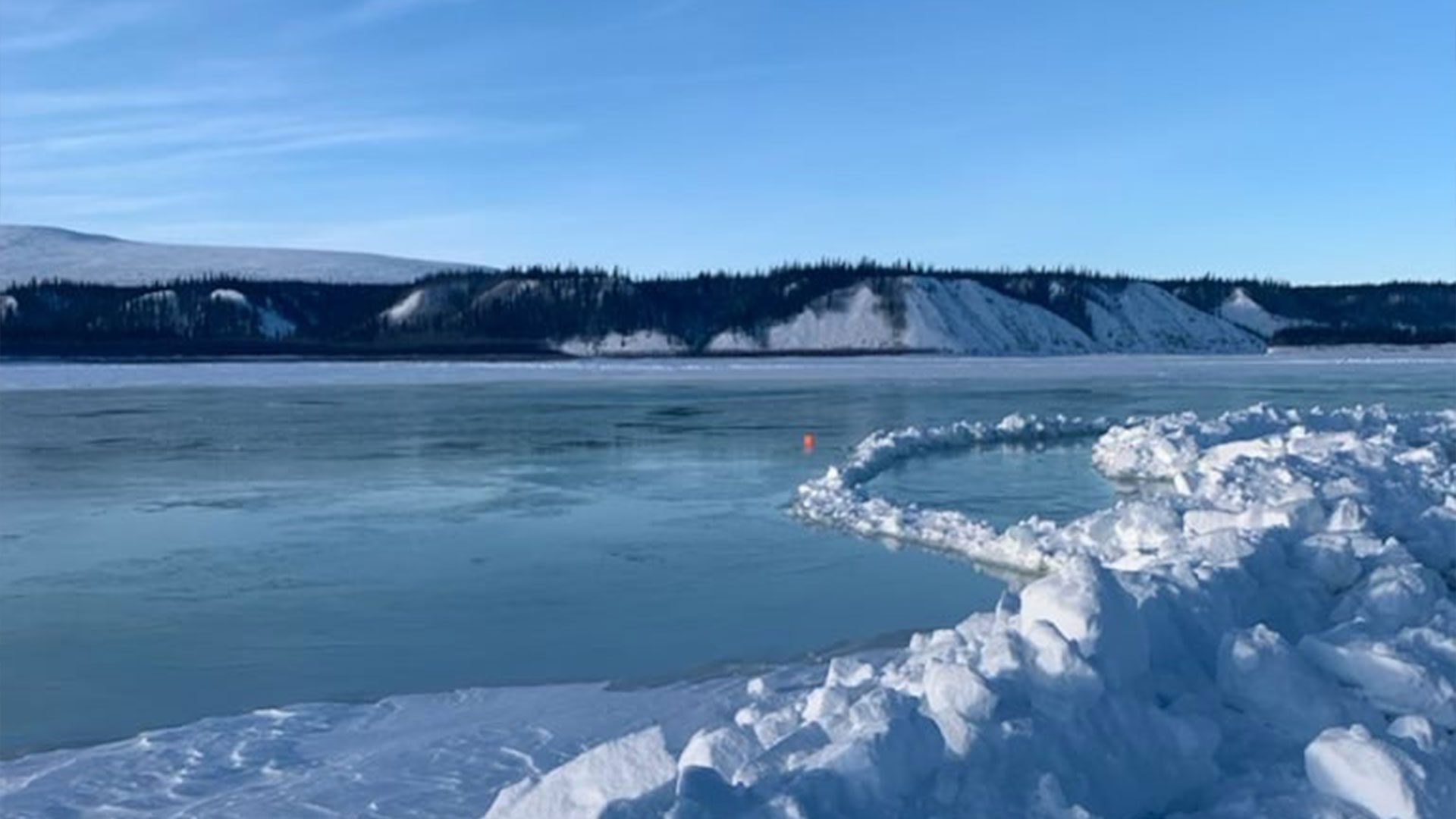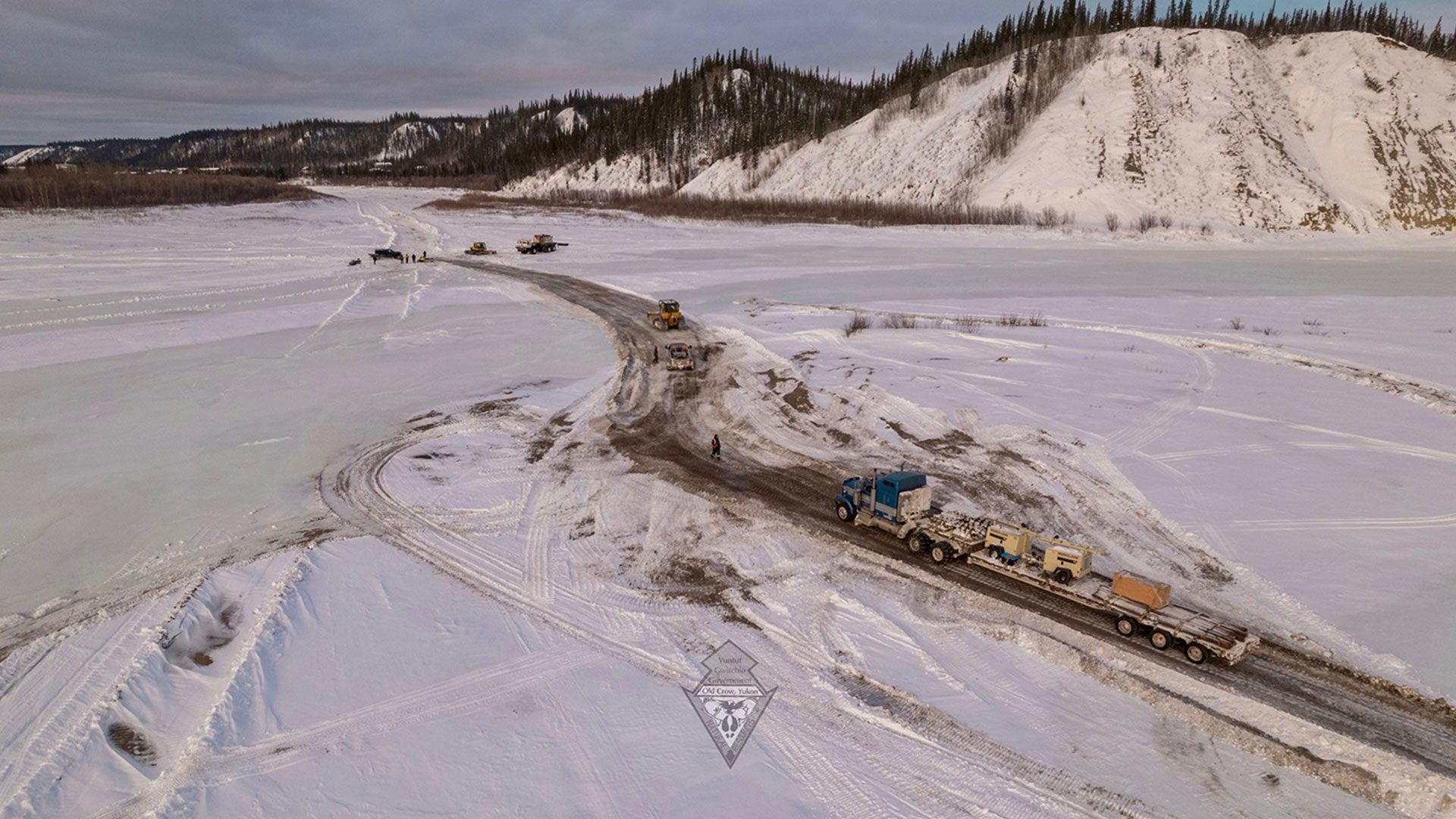It’s an incident weighing heavily on Vuntut Gwitchin First Nation Chief Dana Tizya-Tramm, showcasing how climate change is rapidly impacting the North.
Last week Tizya-Tramm’s community of Old Crow was in limbo for five days because a convoy of trucks delivering building supplies by ice road was prevented from arriving due to an aggressive overflow which is the result of ice and snow pushing down on a body of water like a river, forcing water up over the ice.
“We’ve never seen anything like it before,” Tizya-Tramm says. “For this ice road to be threatened by an unforeseen plume of overflow in our community, what it makes me think of as a leader is what are we going to be seeing in the future?”
On Feb.25 a convoy of six trucks left Eagle Plains in northern Yukon for Old Crow, a remote fly-in community 80 km above the Arctic Circle.
A specially built ice road was constructed for the trucks in order for them to deliver building supplies for several capital projects including a new state-of-the-art elder’s complex and health centre.
The community does not typically have access to an ice road and hasn’t had one built since 2014.
On Feb.26 the convoy came to a river crossing just 10 km outside of the community but was unable to go any further.
“The overflow started just north of our community in the Crow River and has actually gone down the Porcupine River on top of the ice two-and-a-half feet which is incredible,” Tizya-Tramm says.
“The trucks came up to this and there was no way they were going to challenge it.”
Tizya-Tramm says overflow is extremely dangerous. He notes he has been getting reports from hunters of them falling through the ice in areas where this has never happened before.
“Imagine quicksand at -40 (degrees Celsius). Our hunters know to keep an eye out when travelling on the water because it’s very dangerous in the wintertime, but overflow especially, if you get stuck in overflow, you’re putting your life at risk,” he says.
For five days the convoy was unable to enter the community until alternative routes could be found. Tizya-Tramm says luckily the trucks were self-sustained units where drivers could sleep and had access to food.
Eventually, the truck’s crew and community members built an ice bridge which all trucks were able to cross safely into Old Crow by the morning of March 3.
Sign of climate change

Tizya-tramm is concerned the incident is linked to a bigger problem.
“It absolutely, unequivocally is linked to climate change,” he says.
Tizya-Tramm worries the overflow is yet another sign of a drastically changing environment, especially in regards to weather.
He notes this past summer a local river was less than half its capacity, and in December the community only had a few centimetres of snow in the forest which elders and traditional harvesters “had never seen before.”
In 2019, Tizya-Tramm declared a state of emergency saying that their traditional way of life was “under threat from the rapidly changing landscape.”
Tizya-Tramm, quoted in a Health Canada study on the effects of climate change on Indigenous Peoples in Canada, says “It’s going to be the blink of an eye before my great-grandchild is living in a completely different territory, and if that’s not an emergency, I don’t know what is.”
The report says because some activities are limited, the crisis is causing the “loss of knowledge and land skills related to weather prediction, transportation to hunting grounds, and wildlife patterns, leading to increased risk of injuries and fatalities and reduced access to country food.”
Tizya-Tramm says this year, Old Crow has had huge dumps of snow and it’s been -40 degrees Celsius for almost three months. Weather and seasonal changes also appear to be delayed by around a month.
He notes a new report by the Intergovernmental Panel on Climate Change states weather will become very volatile as the climate changes.
“As people who are 80 miles (128 km) north of the Arctic Circle, I’m able to relay to all of your listeners that everything we can see, that we can feel or experiencing, we are noticing changes,” he says.

Chris Derksen, a research scientist with Environment and Climate Change Canada, says aggressive overflow is consistent with climate change.
“This combination of heavy snow, on top of perhaps thinner than usual ice, that is exactly the type of conditions that lead to these types of overflow events,” he says.
He adds northern communities can likely expect to see more events like severe overflow due to warming temperatures and increasing snowfall.
Derksen says he hasn’t heard of other communities’ ice roads being impacted by overflow. However, he says other ice roads could potentially be affected as climate change continues to alter the environment.
“There are a lot of other communities across northern provinces and territories in Canada that really rely on ice roads, so we’re quite concerned about what the impacts of climate change will be on the safety and sustainability of these ice roads in the future,” he says.
Tizya-Tramm says it’s now more important than ever that people in the south pay attention to what’s happening in the North.
“If we’re seeing this in Old Crow, then Canadians and Yukoners will be seeing this in time to come in the south as we are a canary in the coal mine.”









